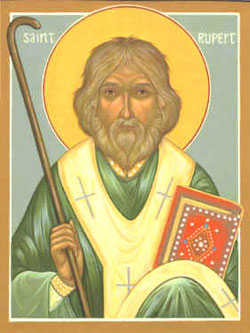|
|||
|---|---|---|---|
| This weekly bulletin insert complements the curriculum published by the Department of Christian Education of the Orthodox Church in America. This and many other Christian Education resources are available at http://dce.oca.org. | |||

Many people know Salzburg, Austria as the birthplace of Wolfgang Amadeus Mozart, who was born there in 1756. But the Church commemorates Saint Rupert of Salzburg, who lived there ten centuries earlier and did great work in spreading the Gospel and building up the Church. Before his years in Salzburg, Rupert was bishop of the area around Frankfurt, Germany and was confessor to the Frankish king Childebert. Though he had himself been born into the proud Frankish nobility, Rupert believed humility and simplicity were the most important qualities for a Christian to cultivate. He used up his inherited money in caring for the poor, fasted strictly, and spent hours in prayer. In his administrative duties as a bishop, Rupert became known for his willingness to hear all sides of a disagreement. He would then make decisions that were carefully and prayerfully thought out, and as fair as possible to everyone. Like most priests, he especially loved to preach and teach about Jesus Christ and the Gospel. His sermons attracted listeners from far beyond the region he oversaw, and as a confessor he strengthened the faith of people who came to him. His reputation for giving wise advice, always based on the teachings of Christ, led political leaders in the vicinity and even from other countries to consult him. But Rupert's prominence inspired jealousy and resentment in some. The problem was compounded by the fact that powerful pagan influences were still at work among the people. Rupert's ability to advance Christianity was feared by the most superstitious among them. The growing feeling against Rupert finally led to his being beaten with rods and exiled. The Duke of Bavaria had heard of Rupert's excellent work, and was appalled by the harshness with which his countrymen were treating the humble bishop, though he himself was still a worshipper of idols. He invited Rupert to come to Bavaria so that he and his people could be enlightened in the faith. Rupert accepted the invitation with joy and a bit of trepidation at the enormity of the task. Once the Duke had received baptism and understood what a great, saving gift it was, he gave Rupert a ship and crew to sail down the Danube River. In the towns and villages along the way the bishop preached and taught, heard confessions, and baptized. In time Rupert went to live in the ancient, now desolate city of Juvavia, and with financial backing from the Duke built an episcopal cathedral high in the remote mountains nearby. He added land and buildings, creating a center for spiritual learning from which trained priests went out to spread the faith. He built a women's monastery and encouraged women to take up the monastic life. Rupert promoted the mining of the abundant salt in the area as a means of supporting his missionary work. Some depictions of the saint show him holding a large container. It's filled with salt, appropriate for Saint Rupert, who is largely responsible for the fact that the city once known as Juvavia is now Salzburg. |
|||
